#Eric Saward
Text
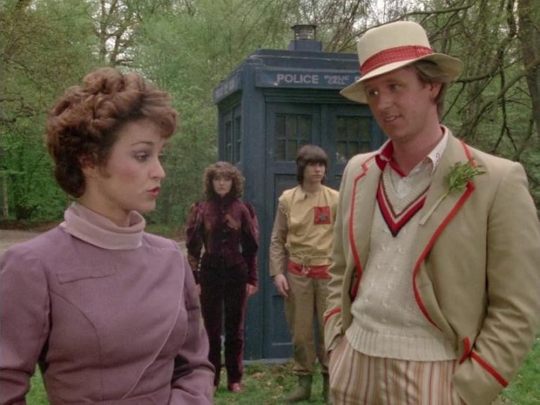


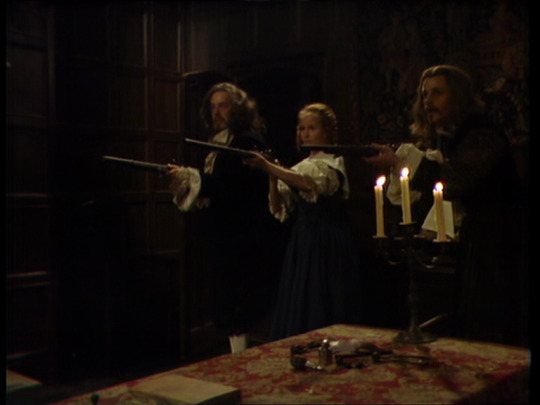
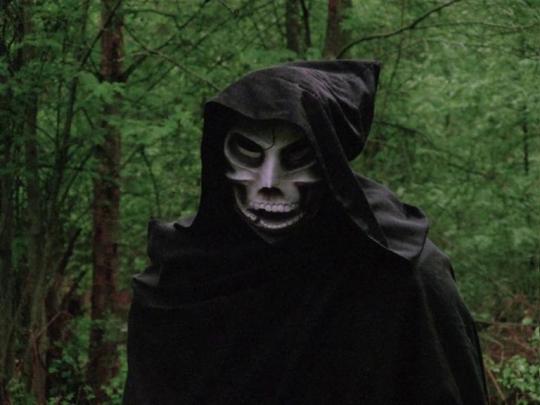


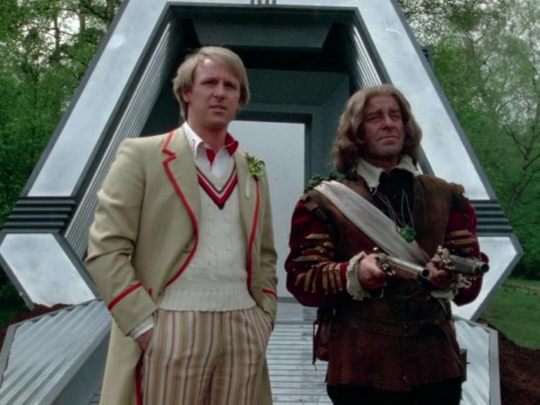
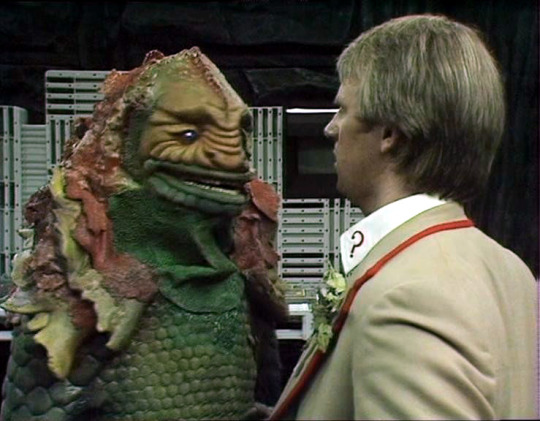
Doctor Who: The Visitation (19.4, BBC, 1982)
"I feel as though you've just killed an old friend."
"It is with some sadness that I tell you you are about to join it."
"Why not smile and let me live?"
#doctor who#the visitation#classic doctor who#bbc#1982#eric saward#peter moffatt#peter davison#janet fielding#sarah sutton#matthew waterhouse#michael robbins#michael melia#peter van dissel#james charlton#neil west#eric dodson#john savident#anthony calf#john baker#valerie fyfer#still continuing to dig up the Who stories i missed as a nipper‚ and for the first time in recent memory i do find myself just slightly#disappointed. idk‚ i enjoyed the general plot outline here‚ the design of the terileptils is ambitious (if the execution not quite matching#it) and Michael Robbins is an enormously fun mvp; but that plot is propping up a fairly pedestrian script (Saward was capable of much#better)‚ the villains aren't fleshed out enough and Robbins is the only character who feels genuine‚ with every one else a 2d insert (ok so#most are under psychic control‚ but i should have been able to tell which ones were and weren't...). also a terrible waste of the wonderful#John Savident! but the film inserts look great (has this had a blu release yet? surely a prime contender) and i enjoyed five and Mace's#little double act. i will say that the tardis fam in full bickering mode is not my preferred group model: Nyssa is the only reasonable#person in the group here and she spends most of the story isolated in the tardis (bc she's doing what she was told to do!) so that's a#little disappointing. idk maybe my opinions will soften. not bad by any means‚ but could have been quite a bit better with a little polish
23 notes
·
View notes
Text
Reviewed: Doctor Who -- Earthshock Audiobook
Reviewed: #DoctorWho -- Earthshock Audiobook
Earthshock was a huge story when it was made and released in 1982. We’re now in 2024 and Earthshock is still a huge story. Not only does it bring back one of the most popular villains and arguably cemented them as one of the Doctor’s best adversaries, it also features the shocking death of one of the Doctor’s companions, something that hadn’t been done since Katarina’s death in The Daleks’ Master…
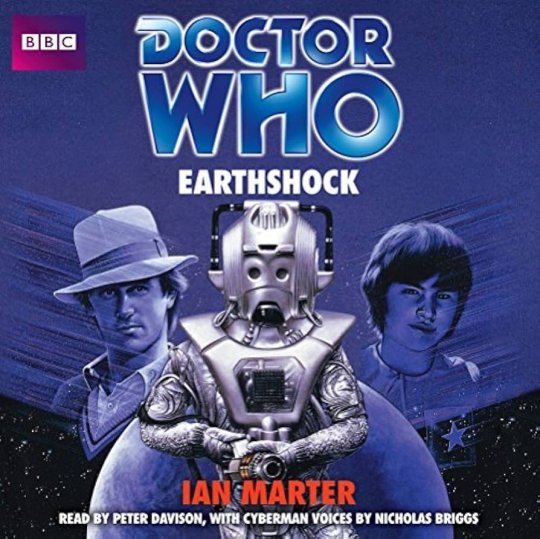
View On WordPress
#Adric#BBC Audiobooks#Cybermen#Earthshock#Eric Saward#Fifth Doctor#Ian Marter#Janet Fielding#Matthew Waterhouse#Nicholas Briggs#Nyssa#Peter Davison#Sarah Sutton#Target Books#Tegan Jovanka
3 notes
·
View notes
Text
Radio Free Skaro #927 - Fonts of Knowledge
Radio Free Skaro #927 - Fonts of Knowledge
- First #Gally1 guest announcement!
- Adventures in Type and Space with Graham Kibble-White, Jack Kibble-White, and Stuart Manning!
http://traffic.libsyn.com/freyburg/rfs927.mp3
Download MP3
It’s getting close to new Doctor Who and the 60th anniversary and it’s also getting close to new Gallifrey One, as seen by the first batch of guest announcements including Alex Kingston, Lalla Ward, Segun Akinola, and more! In 59th anniversary news, Doom’s Day comes to an end, there are new dollies on the way, and our special feature…
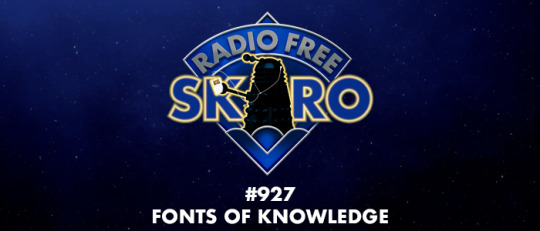
View On WordPress
#Action Dollies#Adventures in Type and Space#Alex Kingston#BBC#Big Finish#Character Options#Doom&039;s Day#Eric Saward#Frazer Hines#Gallifrey One#gary russell#Graham Kibble-White#Jack Kibble-White#Jacqueline King#James Goss#Jason Haigh-Ellery#John Dorney#Jonathon Carley#Lalla Ward#Lisa McMullin#Mark Morris#Matthew Waterhouse#Nabil Shaban#Ray Holman#Revenge of the Cybermen#Segun Akinola#Simon Guerrier#Stuart Manning#Time and the Rani
0 notes
Text
Today in Harry Sullivan thoughts:
If the Rani met him she would absolutely turn him into a tree. Good thing he did not meet the Rani!
2 notes
·
View notes
Text
admittedly still haven’t watched his era, but hearing about his additions to the lore and being delighted, i do wonder if maybe TPTB told chibnall to tone down a lot of the EU-who references just so they wouldn’t have to reprint lungbarrow and have someone start looking into who exactly owns the rights to the book of the war
#doctor who#chris chibnall#thirteenth doctor#lungbarrow#the book of the war#faction paradox#also i'll admit hearing about his EXECUTION of those concepts has me thinking him a bit eric saward#he clearly is a loom enjoyer i'll say that#like there's a guy who also had the remembrance of the daleks novelization as a kid and thought 'holy looms batman'
6 notes
·
View notes
Note
When are you going to do your next chronological Doctor Who post?
Lol I realise I did two more tonight but I'm answering this anyway because Steff and I made a very stupid decision tonight so this is my announcement:
We are going to include one (1) story from the English series.
Just one. No others. It would take far too long to do the whole thing, and to be honest, I wouldn't want to - some of those Hartnells were a slog, and I find most of Colin Baker unwatchable (I'm sorry Colin you were actually fab, the problem was very much Eric Saward and also that awful slug). But we're idiots and thought putting in a single story would be funny.
I will not say what it is. You'll find out when we get to it. I am VERY interested to see if anyone guesses.
I will say, though, that at least one element of this story will recur in the Welsh series. I will not say if there's more than one; I also will not say what sort of element. It could be a character, an actor, a monster, a villain, a place, an institution, an object, anything. We may have already encountered it, we may not. But there is a link, so it will sort of count in the plot threads (or not, as the case may be).
Why are we doing this? Because we're idiots and like chaos.
70 notes
·
View notes
Text
while obv i approve of the sentiment behind that post that’s like “80s who showrunners didn’t want any hanky panky on the tardis but they were ok with turlough & the doctor being alone together 👀” like. they very much were not ok with that. for exactly that reason! as per eric saward in dwm 347:

if anything a more compelling case
#also i know next to nothing abt jnt but knowing that he was an openly gay man...#like yeah i can completely understand him worrying about it. doesn't seem that hard to comprehend?#vislor turlough#fifth doctor#dw
31 notes
·
View notes
Text
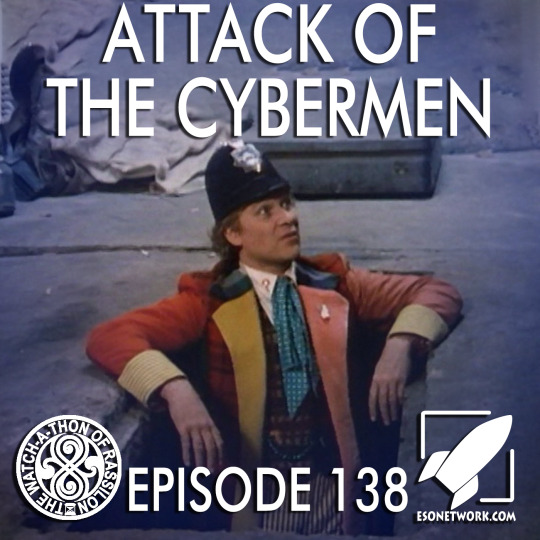


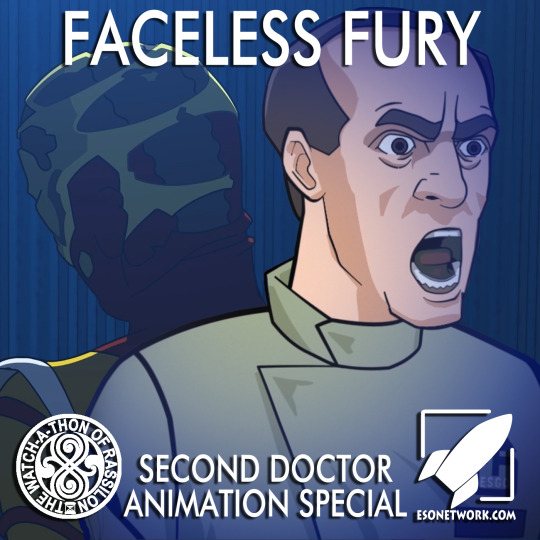
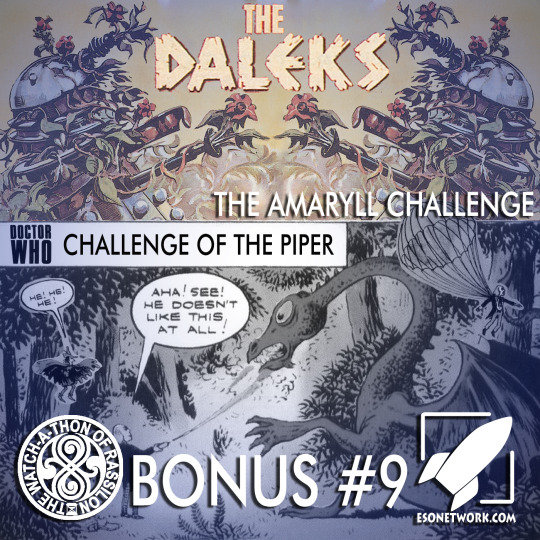

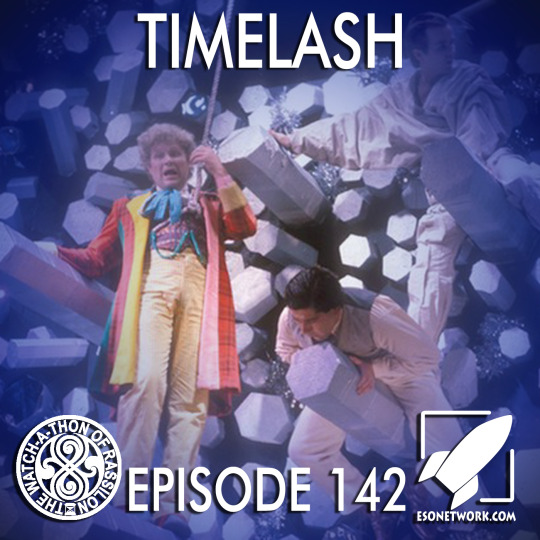
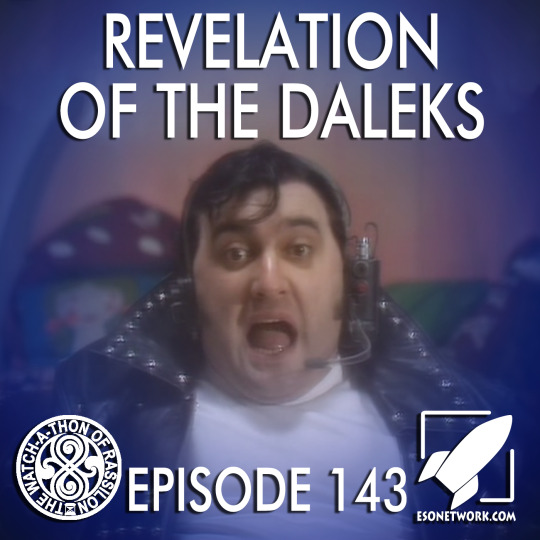

It's the 9 year anniversary of The Watch-A-Thon of Rassilon, so this month we're sharing our older episodes!
SIXTH DOCTOR
SEASON TWENTY-TWO (March 3rd, 2021-July 21st, 2021)
Episode 138- Attack of the Cybermen (Eric Saward is a Dick)
Episode 139- Vengeance on Varos (Mouth Sounds)
Episode 140- The Mark of the Rani (The Polycule of Rassilon)
Second Doctor Animation Special - Faceless Fury (Mouth Moods)
PATREON EXCLUSIVE Bonus Episode 9- The Amaryll Challenge/Challenge of the Piper (He! He! He!)
Episode 141- The Two Doctors (The Two Jasons) w/ @truestoriesaboutme & @benpaddon
Episode 142- Timelash (Too Many Steps to Nothing)
Episode 143- Revelation of the Daleks (Blue is the Mournest Color)
Hiatus Special - A Fix with Sontarans (Podcast in Distress) w/ @truestoriesaboutme, @mgoldentumbls, Felicity Kusinitz, @raisegrate, Welli Friesen, & Hallie Larsson
#doctor who#classic who#sixth doctor#colin baker#second doctor#patrick troughton#episodes#comics#Christine Cherry#Ben Paddon#Matt Golden#Felicity Kusinitz#Ray Friesen#Welli Friesen#Hallie Larsson
11 notes
·
View notes
Text
A Finely Tuned Response - Frontios, 1984
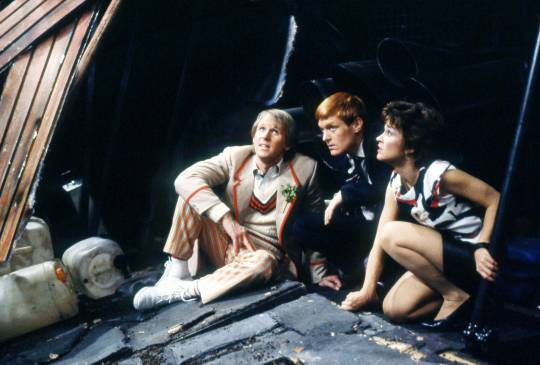
An analysis of Doctor Who of the early to mid 1980s is, somewhat inevitably, an examination of wasted potential and this is a particularly pertinent point to consider when embarking on a critical look at Frontios. To some extent, Frontios is business as usual for the Peter Davison era. Along with The Awakening, it stands-out for being one of only two stories in the season that is not carrying the weight of an enormous event. It is four episodes long, features a typical Doctor Who monster, slots itself effortlessly into the action-packed militaristic flavour of the Davison era and repurposes the trappings of past base-under-siege serials for good measure. This is probably why it gets such little attention from the fandom on the whole; Frontios is a story conceived to slip under the radar.
But I think that Frontios does anything but be unnoticeable. It is screaming to be noticed because I think that this story, more than any other of the Davison era, is the story of untapped potential. Frontios takes everything that we know about the Davison era, every aspect of it that was working, and offers us a glimpse into an alternate reality where everything else also works just a little bit better still. This is thanks to former script editor Christopher H. Bidmead, one of a handful of writers who could comfortably stake the claim of one of the most underrated in the series' history. Bidmead script edited the show from 1980-1981, the entirety of season eighteen, and is notable for following through with John Nathan-Turner's intention to shift the style of storytelling in Doctor Who away from the high-concept, camp adventure series of the previous regime toward more serious-minded stories that had a basis in real-world science. In Bidmead's own words, "[Doctor Who] exemplified for young viewers the power of scientific thinking to solve problems. Science stretched into fantastic future shapes, yes, but the show had a serious social purpose. It must never be silly, never be mere magic....we tried to build our stories on solid, if fancifully extended, scientific ideas."
It is worth stating the obvious here; this philosophy returns the show to its 1963 roots of being educational as well as entertaining. The result of Bidmead and JNT's collaboration was a run of seven stories that had an entirely unique flavour for the franchise. Stories that were rich in theme and subtext, revelling in the unknown possibilities of bleeding edge theories. Take Warrior's Gate, for example. Taking place in the theoretical zero point between positive and negative space, that serial watches like a surreal, poetic and atmospheric novel that meditates on I-Ching philosophy, exploring notions of action, free-will and entropy. Warrior's Gate is a dense and thoughtful production whose characters and setting all interlink to form a greater thematic whole. A bit over twelve months later, Doctor Who was broadcasting stories like Earthshock.
That sounds a little bit more disingenuous than perhaps it should because Earthshock is not a bad story in and of itself but it is a very different story. The tumultuous production of Warrior's Gate and the overall difficulties of Bidmead's position lead to his resignation at the end of season eighteen. The post would eventually be filled by Eric Saward whose conception of what made for a good Doctor Who story wildly contrasted with Bidmead's. Earthshock proved to be the template, the definitive statement for what his ambitions were with Doctor Who; a thrilling, action-packed adventure with a confident blend of character drama and sci-fi serial antics. To use a low-hanging and easy shorthand example, if Bidmead's Doctor Who could be compared to say a Christopher Nolan film then Saward is somewhat of a Zack Snyder.
But this brings us back to the accusation of wasted potential because I would argue that the Fifth Doctor's era is marked by inconsistency more than it is by abject failure. I find it rather interesting that both JNT/Bidmead Who and JNT/Saward Who make a concerted effort to return the programme to something resembling the original conception of the show but in polar opposite ways. In the latter case, it was a more superficial attempt with the turn back toward an ensemble cast and the attempt at tighter stitching from one serial to the next. Most episodes of the Davison era connect in some direct way to the previous one, even if that connection usually little more than a couple of lines at the top of the episode addressing something from the previous one.
The approach that JNT and Saward were aiming for in these three years together, that of an explosive science-fiction soap-opera, is a perfectly valid take on the programme. It was even an effective one on occasion. The problems with Saward's tenure as script-editor are myriad and deserving of dissecting in a piece more dedicated to him but suffice it to say that what Frontios accomplishes is a case of a serial coming together in spite of its circumstances instead of coming out of them. When Bidmead was invited back as a freelancer for Davison’s third, and final, season, he incidentally offered a tantalising glimpse into the era that might have been if he had stuck around with the show. If nothing else, he reaffirms one thing; wildly creative and conceptual science-fiction stories can work hand-in-hand with serialised, evolving character drama.
In contrast to what one might expect, Frontios can perhaps best be described as Bidmead’s most traditional Doctor Who story. Saward invited him to contribute a pitch for a serial in season twenty-one but on the condition that he was to craft something in the mould of a traditional Doctor-Who-monster-plot. As Bidmead recalled in a 1988 interview for Doctor Who Magazine; "Eric Saward phoned me up and asked me to do ‘Frontios’. They wanted the monster element, which was a struggle because I always hated ‘Doctor Who’ monsters – partly because they tend to look cheap and mainly because they are so limited on dialogue. Dialogue is so important in a low budget show – it creates the whole effect". In so far as being a typical monster story for Doctor Who, the broad strokes of Frontios appear to offer little in the way of innovation. Our trio unexpectedly find themselves among colony of humans in the far future only to quickly discover that an unknown, alien threat is causing colonists to disappear into the planet itself. On one level, perhaps this is disappointing for the staunch season eighteen fans (god forbid those nerds ever out themselves) that Bidmead’s final effort on-screen is such traditional fare but, make no mistake, this is Bidmead all over. Where else would one find a story that revels so much in making the setting a character unto itself, or an active threat in this case. There is an almost primal irrational fear underpinning the horror of Frontios which is that of the Earth dropping from beneath you, consuming you without a trace. It is a great idea and legitimately terrifying at a conceptual level. Frontios is the last hope for humanity, the final place that they can run to and this here is the horror at the end of human existence; what comes for us all when there is nowhere left to run?
Frontios is a story about people being where they shouldn’t which is about as clued-in to the central premise of Doctor Who as one could possibly be; the entire franchise is a story of things being where they shouldn't. I love the Doctor’s initial flat refusal to explore Frontios in any way because “knowledge has its limits”. It is an interesting slice of lore, that never really gets picked up on again, that the Time Lords have a limited scope of the arc of history. Perhaps because pulling on this thread could lend too much credence to the theory that Time Lords are future human beings. After all, is there any particular reason why the Time Lords knowledge has a cut off point that coincides with the near end of humanity? It is an effective shorthand to illustrate the stakes at play here and set the scene for the audience but remains an oddly intriguing nugget of lore too. I would not be surprised if this story directly influenced Russell T Davies when he came to writing Utopia since that story also presents the Doctor as going further than ever before and having the immediate reaction of wanting to leave. In this case, I adore that as soon as the Doctor does land, he immediately launches into helping the humans despite what his rational mind has concluded. It is also a little bit weird that the Doctor’s behaviour ultimately leads to no consequences from the Time Lords. We are told repeatedly that he is forbidden to interfere here and that the time laws do not permit his actions. If Saward were a bit more on his ball, perhaps this could have been the inciting incident that puts the Doctor back on trial two seasons from now as opposed to just…well, nothing really.
Bidmead does not write small scale stories. Even this one, which is relatively small fry in the narrative of this season, is as high stakes as actually destroying the TARDIS. Bidmead claims to have done this to give the Doctor no form of security, have him just as desperate and endangered as the humans. Everything is against the Doctor here which makes for a nice unintentional parallel to The Caves of Androzani (also penned by a former script editor) where the same can be said but he’s just a lot less lucky. What is frustrating is that the script makes really no attempt to explain exactly why or how the TARDIS is destroyed. The Gravis does not even know it is there. The Doctor does have one line about it toward the climax; "It's, er it's been spatially distributed to optimise the, er, the packing efficiency of, er, the real time envelope" which sounds dreadfully like he is making it up. Is he suggesting that the TARDIS folded in on itself in an effort to protect itself from the meteor strike? Or was the meteor strike actually supposed to have splintered it? Surely not that second thing since Tegan and Turlough found it to be largely closed off just moments after landing, I have no idea what is really going on here and have yet to find a clear answer in the text but it is a lovely way to visually illustrate the consequences of the Doctor going behind where he even feels he is permitted to travel.
If there is anything that significantly hurts Frontios then it is the production. While not necessarily cheap, the horrific cliffhanger to part three is realised about as well as it could be, this story is hampered by shoddy direction from Ron Jones and some generally poor design. A lot of the horror that ought to be here is nearly squandered by the way the thing is assembled and that is truly frustrating. There is some god awful acting attempting to ‘lift’ some rubble in episode one. How that made it to screen I will never know. In concept, the Tractators are a deeply disturbing villainous creature with their inhuman features and mental powers to ensnare any victim they choose no matter how hard they run. Their plot to chop up human beings to ensure their machinery works was so freaky that Steven Moffat likely stole it to be much scarier in 2006. Bidmead based the monsters on woodlice and, while that intention extended into the design, the Tractators are the textbook definition of a lumbering “Doctor Who monster”. Practically every moment of action they have in the entire story falls completely flat and the monsters are not even remotely scary. They just look like crap. Apparently Jones hired dancers as he imagined the Tractators to curl up like woodlice, something that Bidmead intended in the script. Visual effects designer Dave Harvard did not get this memo it seems. There is a distinct lack of menace and thrill displayed onscreen here despite what are, really, a perfectly strong set of scripts to work from. It is a real shame.
Thankfully, the production can deliver on Bidmead's well-developed supporting cast and he provides a compelling far-future colony for the TARDIS team to get entangled up with. Range is a much an endearing scientist figure to pair the Doctor up with as Plantagenet and Brazen make an irritating opposing force. It is a decidedly bleak vision of the future; a fascist, totalitarian state. In her analysis of the serial, Elizabeth Sandifer makes the suggestion that Bidmead’s more cerebral, world-building story is constantly under jeopardy by Eric Saward’s stock-standard military story, invading the scenes as an opposing force that tries to stop the story from happening. Whether Bidmead was deliberately poking at Saward's tendencies as a writer remains to be seen but it is a very fun read regardless. Bidmead has cited the 1982 Lebanon War as an influence on his scripts which, as of time of writing this article in March 2024, is an interesting situation to cite. The Lebanon War took place between June 6 1982 and June 5 1985 between the Israel Defence Forces and the Palestine Liberation Organisation. The inspiration from the war can certainly be identified in what Frontios would become though it would be absurd too suggest that the story is analogous for the conflict itself. Certainly, the broad strokes of the situation informed the plot but the most significant contribution was an aesthetic one with the serial's war-torn landscape that is clearly suffering from a near constant bombardment that has slowly increased in frequency and intensity over several decades. Indeed, as Range and the Doctor state;
RANGE: Captain Revere assumed that the barrage was some sort of softening up process. Heralding an invasion, he said.
DOCTOR: Hmm, someone else thinks this is their territory.
Revere is half-right. Frontios is an invasion story; the humans are the invaders. This flavour of anti-colonial storytelling is not particularly new ground for Doctor Who to tread and would certainly continue to be well-walked although the allegory becomes a little bit murky in this case with the suggestion that the Tractators are not indigenous to Frontios either. Perhaps the situation of two invading forces staking claim to a land that rightfully belongs to neither was ripped straight from the headlines but the absence of a third party makes it a rather more simplistic and less challenging situation to depict. Again, the influence is purely aesthetic. Cutting edge political satire doesn’t seem to be something Bidmead is particularly interested in anyway, regardless of his effectiveness in writing it.
So, we can conclude that the Tractators are likely not indigenous from pretty early on in the story thanks to Turlough who is awarded one of his strongest roles in any story pos-Enlightenment. Following his failed plot to murder the Doctor, the shifty and morally ambiguous nature of Turlough became an aspect of his character that was largely cast aside. Turlough was introduced as an untrustworthy and selfish survivalist whose past life before exile on Earth were primed to make him a greatly compelling member of the TARDIS team moving forward. However, instead of gradually unravelling this mystery and pushing Turlough’s relationship with his “friends” to their furthest extent, the character spent most of his stories was just separated from the Doctor for about half of the runtime to simply complain and look a bit suss from time to time. A lot of potential character work seemed to be abandoned and relegated to these four scripts and his final story, Planet of Fire. This is yet another example of Saward's limits as a script editor and really the most damning one considering part of this period's mission statement was to be a quasi soap-opera.
After laying eyes on the Tractators, we see a new side to Turlough; pure, genuine fear. Our first glimpses at his origins are finally awarded to us when a race memory is unlocked within him that sees him recoil from the action in a catatonic state. He has a primal reaction to the creatures below the surface. Being the only person with knowledge of the monsters, he gradually pulls himself together and returns to help the Doctor. While not especially interesting an arc in itself, this is a rewarding series of events to put Turlough through if you have been following his story since Mawdryn Undead since it seems that only now he has truly embraced being a force for good with the Doctor and not just a traveller in it only for himself. This is all really solid stuff and Mark Strickson does a decent enough job with it. Turlough lamenting that nobody expects anything heroic of him is a really lovely character moment and this story marks a significant turning point for the character that comes too late. This is the kind of on-going melodrama that should have been present in this era the entire time and this particular development for Turlough needed to happen at, at the latest, the end of the last season. Not two stories before his departure. For his active role as a companion to be claimed eight stories into his run (effectively after twenty-eight episodes on the show) is ludicrous. Even more frustratingly, Turlough takes a backseat again in the next story leaving Planet of Fire to race his character to the finish line and it proves once more that the potential for greatness is all there but this was too little too late.
Tegan is the most sidelined of the three which is irritating not only because this would prove to be her penultimate appearance on the show but also because it officially becomes a pattern of the third story now to give her no kind of active role in narrative. The next serial would do that too though it could be argued by design which is a weak defence in the face of a whole season awarding her next to no material. Given where her character was set to go in Resurrection of the Daleks this and the nature of her departing the TARDIS, this would have been a great time to highlight the brutality of the Doctor’s travels and drop her in the midst of some truly awful acts. Long-form story was really not Eric Saward’s strongest skill.
And then we have the Doctor. Three stories away from his own dramatic exit and finally he feels like he has fully come into his own. This is perhaps the most frustrating realisation to grapple with in regards to Bidmead’s leaving the show; the man knows how to write the Doctor. His take on the character sees the frustratingly underdeveloped Fifth Doctor in a fully authoritative role; barking out orders and opinions to whoever he pleases and commanding presence as much as he needs to. This is a character I would have loved to see for three seasons and it pains me that he is only really found here and in Androzani. At the heart of Frontios is a very simple story that about leadership in a decidedly anti-militaristic sort of way. The humans are being driven by the military but lacking in unity as their leadership in Brazen and Plantagenet is a self, arrogant and narrow-minded leadership that dismisses their scientists and the Doctor when he arrives. As we learn about the Tractators, their leadership is flawed too as the creatures are revealed to be naturally passive without the command, being enslaved, by the Gravis. So, we have the Doctor who is driven but understanding. He listens to the facts, he makes measured judgements and he considers the breadth of his actions. The Doctor is the shining example of good leadership in this colony. It is a very simple moral but who ever said that simplicity was a bad thing?
Sandifer made the acute observation in her Warrior's Gate article that "The Doctor that Bidmead wants are the Doctors that [David] Whitaker wrote for – the small and seemingly harmless men who skulked and observed and learned to understand the system before making a single decisive move within it. Not the Doctors of the 70s – big, starring leading men who were the centre of attention and whose charisma and likability drove the entire story". Here we have found ourselves with, frankly, the biggest victim of wasted potential in Peter Davison's run which, obviously is Peter Davison. It is well-documented that part of JNT's strategy in casting Davison was to provide a stark contrast to the scene-stealing Tom Baker. The Fifth Doctor was a less commanding and intrusive presence by design which is all well and good if your target is a more Whitaker-style take on the character. The problem is simply that they missed.
To this day, the Fifth Doctor comes under fire for being a bland incarnation but that is only half of the truth. What fans criticise as blandness is what I would sooner articulate as a lack of definition. The Fifth Doctor as a character was primarily defined by the things that he was not in comparison to the previous four actors instead of the things that he actually was. This Doctor was not old, he was not commanding, he was not infallible, he was not funny, he was not flippant, he was not cruel, he was not Tom Baker – he was not a lot of things and the things that he was varied greatly from one story to the next. Perhaps this is a little unfair since there was at least an intention of who the Fifth Doctor was supposed to be, even if it was not fully realised onscreen. It is at this point that I feel compelled to clarify also that Davison was not at all the problem here. He is an excellent actor who had very strong and compelling instincts of how to play the part, some of which he and JNT agreed on. In 1981, Davison conducted an interview with Radio Times where he made an attempt to outline his vision for the role;
"I’ll be a much younger Dr. Who, and I’ll be wearing a kind of Victorian cricketing outfit to accentuate my youth. I’d like my Doctor to be heroic and resourceful. I feel that, over the years, ‘Doctor Who’ has become less vital, no longer struggling for survival, depending on instant, miraculous solutions to problems. The suspense of ‘Now how’s he going to get out of this tight corner?’ has been missing. I want to restore that. My Doctor will be flawed. He’ll have the best intentions and he will in the end win through, but he will not always act for the best. Sometimes, he’ll even endanger his companions. But I want him to have a sort of reckless innocence."
This is not quite a description of who the Fifth Doctor is not but in terms of being a definitive statement on what he is it is still somewhat lacking. “Heroic and resourceful" are satisfactory descriptors and the suggestion that he has a “reckless innocence” seems to indicate that he is perhaps simply naive. To say that he is flawed is not particularly revealing without actually delving into what the flaws are but this is certainly a start. There is a blueprint here with which to construct a fully-realised character but the one that made it to screen oscillated wildly from seeming compelling to inoffensive to, yes, bland.
Given the revolving door of script-editors during season nineteen's production, it is perhaps not surprising that, despite having some strong stories on the whole, it was not a definitive opening statement for the Fifth Doctor. Castrovalva took the Doctor out of action for most of its runtime and then had him in the post-regenerative non-character state that left him open to hopefully be defined later on down the track. The larger part of season nineteen fails to define him particularly well with Four to Doomsday, Kinda and Black Orchid each shooting for the unassuming observer type but fail to give him any truly distinct character traits nor a particularly engaging role in the narrative. It shows a near complete misunderstanding of the Whitaker-style Doctor depicting him not as a mercurial learner but a passive observer. The Visitation and Time-Flight shift gears from this to am extent presenting something in the mould of Jon Pertwee's Doctor on paper. The former, however, leaves him still largely sidelined by its comedy supporting character and the latter makes the unfortunate misstep of being Time-Flight.
The Fifth Doctor in season nineteen is a character whose role in the story is dictated by the narrative conventions of Doctor Who. His name is in the title, he is a heroic character therefore he will heroically save the day even if the plot could have happily rolled on much the same without his involvement at all. Black Orchid even takes this to the extreme when it, upon stumbling upon an opportunity for some drama when the Doctor comes under suspicion for murder, he gets away with it by taking the supporting cast into the TARDIS and going "See? I'm Doctor Who so I must be innocent". The only story to offer any glimmer of the characterisation and subversion that was promised is Earthshock but even that immature, emotionally unregulated character would never really come back onscreen.
Season twenty seems to bring little else to the table besides his being generally nice but a bit exasperated at times (and it is worth noting that the subpar quality of the scriptwriting in season twenty is what ensured Davison would not sign on beyond his three year contract). The Fifth Doctor's lack of authority too often came as a failing in the storytelling instead of a failing in the character. Take how he fails to command a scene with the Brigadier in Mawdryn Undead or the lack of interest anybody has in him during Warriors of the Deep. Snakedance is really the only serial that took this idea and ran when Christopher Bailey had to the good sense to present a realistic reaction to the Doctor showing up prophesying doom for all and made that escalation most of his role in the story. The problem hit its peak by the time The Five Doctors made it to screen which, of course, made an embarrassing show of what little characterisation the Fifth Doctor was awarded. Standing next to Patrick Troughton and Jon Pertwee would be difficult for anyone but the Fifth Doctor managed to make it seem impossible.
Part of the problem with the Doctor's lack of definition, of course, stemmed from the approach, or rather the production team's inability to scale the mountain that they had raised for themselves. Having a leading cast as big as four and small as three for all but one of his stories often left the Doctor struggling to command the narrative in any way. It became easy to lean on an archetypical idea of who 'the Doctor' is to make the stories work. This is symptomatic of the broader issue that this production team was not up to the task that they set themselves of introducing a larger cast for a soap-opera style. Darren Mooney, for the m0vie blog, articulated the issue well in his article “Doctor Who?” The Deconstructed Davison Doctor;
"[T]he Fifth Doctor’s era offered a weird funhouse mirror of the [soap-opera] genre. The companions were all given strong archetypal personalities that were designed to play off one another, but without any detail or humanity to round out those archetypes into characterisation. More than that, there was no real sense of progression or character development. None of the companions grew or evolved."
Consequently, this left the most valuable asset for character definition, his relationships to everybody else, severely under-utilised. Again, this was not Eric Saward's strength but, further to that, it was not even his interest. Saward often claimed that the aspect of Doctor Who that compelled him the most were the worlds and characters explored rather than our main ensemble. A perfectly fine stance but not a particularly good focus to take in the most serialised version of the show since it first began.
Something always worth considering when engaging in any form of art criticism is the relationship between artistic intention and audience interpretation. Obviously, the former informs the latter; an artistic work presents evidence and information that is collected and interpreted by the audience. There are a number of ways with which to use this relationship as the basis of a critique. One option is the focus primarily on intention; the artist means for the piece to accomplish X thing and I have assessed the evidence provided to form a conclusion as to why I think it is or is not successful in that endeavour. This option is only viable if that intention has been made clear in some context outside of the actual work itself. Another way to engage is to ignore intention entirely, the death of the author approach; I gathered evidence from the text and interpreted it in this way which I did or did not enjoy for X reasons. Generally speaking, I find that the most insightful and compelling criticism comes from a mixture of both approaches. I find it equally as valuable to glean the context of which the work is made and what the artist is intending to do as I do being able to allow the work to speak to me and take on a life of its own.
In the case of the character of the Doctor between 1982 and 1984, there is a lot to engage with here. As established above, the artistic intention of the Fifth Doctor was deeply confused and underdeveloped. So let us turn to an interpretive reading, the most popular one that has developed among fans over time which is that the story of the Fifth Doctor is tragedy. This reading suggests that this Doctor is a victim of a circumstance, a moral crusader and conventional hero who becomes worn down and killed by the cruel and ruthless universe around him. It is a really compelling take and there is a good amount of evidence to substantiate it. Earthshock is the earliest example where the Doctor’s role in the climax consists primarily of him failing to negotiate with the Cyber-Leader with no option left but to just murder him as he watches his young friend die in an act of heroism he inspired. Then we have Snakedance where his walking into the story doing his typical Doctor thing sees him vilified and antagonised for the larger part of the runtime. Season twenty-one is where the evidence really ramps up. Warriors of the Deep attempts a similar outcome to Earthshock with the Doctor’s lack of authority leading to him enabling a massacre. Frontios sees him literally drawn into a place he shouldn’t be despite his best intentions. Resurrection of the Daleks is such a clusterfuck that it causes Tegan to leave the Doctor altogether and then his simply being on Androzani places him squarely in the middle of events so devastating that everybody there except for Peri winds up dead.
As a reading on his era, this interpretation holds up very well. It is exactly the kind of character development that should have been the crux of Davison's time on the show and is the kind of thing suggested by the publicity and discussions of his character back in 1981. What makes it so frustrating is how much this was not really present in the artistic intent. Yes, the Fifth Doctor was fallible and one of his companions died but this was little more than an aesthetic choice for the larger part of the era. As Sandifer articulated perfectly in her Earthshock analysis;
"What we get [with Adric's death] isn’t drama. It’s the hollow shell of drama – a major character death, a silent credit sequence, a few minutes of horrified and morose main characters at the tail end of this and the start of Time-Flight, and then everybody – the audience included – moves on. It’s not one of the most dramatic sequences of the 1980s. It’s a cheap sham designed to look like drama. It’s a sequence designed to rile up controversy – the exact sort of death scene that would be created by an executive who believes that art should 'soothe, not distract'".
Earthshock was the most important story of the JNT/Saward administration and it makes it also emblematic of a number of things it fails to get right. Adric's death was wasted potential. If the overall arc of the Fifth Doctor's story is a man who has the best intentions but gets beaten down by everything around him, that needs to be in any way at the forefront of his character and his actions in the stories. Eric Saward thought it important to depict violence in a visceral and impactful way which serves the interpretation but was not a calculated move to develop an actual arc.
By the time season twenty-one came around, Davison had hit breaking point with the bland material and an actual character began to emerge. Beginning with this serial, his Doctor finally showed signs of some consistent characterisation. His Doctor had become snarkier and wittier, his occasional emotional outbursts in season nineteen filtering through as a genuine resentment for authority and pig-headedness. As Davison himself stated;
"Frontios was excellent, an extremely well-rounded script that got hold of the way I saw the part of the Doctor, and made his dialogue and actions fit in with this. I enjoyed it because there was really something there to latch onto in rehearsal and make your own. If you like, it had enough there without the actors having to try to embellish a weak storyline."
Thus, this is why Frontios shines so brightly. With some stronger material to play as well in this story through to his final appearance, Davison gets the best chance of his era to actually act. The Doctor is no longer a passive afterthought in the narrative and the season gains a genuine momentum with escalation from one story to the next until the entire narrative structure of Doctor Who breaks down in The Caves of Androzani. Frontios marks the beginning of the Davison era finally starting to land on what really works. We have a Doctor that is genuinely compelling, a very compelling and unique companion in Turlough and a genuinely interesting story that nails the Eric Saward approach to thrilling, action-packed Doctor Who (if only really in the script than actually on-screen). Frontios is really spearheading this last leg of the Davison era and not by mistake.This is a highpoint of season twenty-one and, indeed, of all ‘80s Who. While this is probably Bidmead's weakest script technically (I'd probably watch this over Castrovalva), it demonstrates that old ideas done well still undeniably make for a story that is done really well but it is no surprise that this solid story is consistently overshadowed by the more obviously ambitious milestones of the Davison era. This is the story the Davison era needed but it is a story that just came too late to save it altogether.
A final word: I had no other place to mention this but the Doctor’s line about being a hat person is a little amusing at this point in his life since he hasn’t been seen wearing one for three stories now – he last donned it in The King’s Demons and won’t again until the story after this
#doctor who#analysis#tv#culture#actors#history#peter davison#vislor turlough#mark strickson#janet fielding#tegan jovanka#1980s#1984#sci fi and fantasy#scifi#science fiction#fifth doctor#classic doctor who#classic who#dr who#the doctor#turlough
16 notes
·
View notes
Note
For the Doctor Who ask meme: 3, 6
3. Which Doctor do you think should have had more seasons?
On the basis of unrealised potential (and leaving Big Finish out of it), there are three obvious candidates: Colin Baker, Paul McGann, and Christopher Eccleston each got less than three seasons, and all showed they had more to give.
I'm going to opt for Colin Baker's Doctor, for two reasons. One is a sense of fair play: Baker was booted from the show, for reasons which didn't really have anything to do with him, just as he was settling into the role. The other is that what more seasons would have looked like isn't just about the actor. It would have been great to see more of Paul McGann as the Doctor, but more episodes like the TV movie we could do without. And I don't think I would have liked Christopher Eccleston being given the character arc that David Tennant was given after he left. (Of course, that character arc might only have existed because a new actor was in the role, and a second Eccleston season might have been very different. But we can only work with the information we have.) If Colin Baker had made it one more season, he'd have outlasted Eric Saward and been working with Andrew Cartmel, who had a vision for Doctor Who that was a lot like what Baker had been wanting to do all along.
6. Which season do you like the least?
A tough question, this. I've seen nearly all of them, and even the ones I didn't like much overall had episodes I liked a lot.
The relatively safe answer is the Flux season, for the reason that it's the only season of Doctor Who that I haven't seen at all, and therefore I do not like (or dislike) any of it.
A more honest answer would be that the reason I haven't seen any of the Flux season is that I watched two or three episodes of the previous season, feeling bored and irritated, and then didn't watch another episode of Doctor Who for two years.
6 notes
·
View notes
Text
That sixie in my notes made me twist my ankle. I was reading their reblog out to my housemate and fell so personally I think this is all Eric Saward’s fault
4 notes
·
View notes
Text
In the end, the Thirteenth Doctor era really was just "What if Eric Saward made the EDAs?" and I don't think that was a thing that anyone wanted but it sure is wild that it exists.
9 notes
·
View notes
Note
There are no bad Doctors or Companions. Only bad writers and script editors. 5 & 6 could’ve been different if they weren’t stuck with script editor Eric Saward and his ”kill or be killed” ethos. His stuff comes off as every nacho anti-hero 80’s film there is with the Doctor only begrudgingly written in as the hero. Both his Dalek stories are very nihilistic with frankly gratuitous body counts and the Doctor not being able to do much to save the day
Honestly I find it wild when ppl completely hate a doctor or a companion. Like, even my least faves I still love so much.
Ten is my least fave partly bc of.. him but also bc yeah, some of his episodes just aren't as good as the episodes in other eras. But as a character on his own, and with his companions on their own outside of some mediocre episodes, I love them all a lot
8 notes
·
View notes
Text
Earthshock by Ian Marter
#Ian Marter#DW#DoctorWho#Books#TargetBooks#ScienceFiction#Fantasy#BookReview#VintageBooks#Classics#TARDIS#Earthshock#FifthDoctor#Celery#Cybermen#Adric#Dinosaurs
1 note
·
View note
Text
Target Practice: Doctor Who and the Visitation
This month, our journey through the Doctor’s literary timeline takes us to 1982: Peter Davison begins his brief three year run as the Doctor on TV, and in books, the first of the Fifth Doctor novelizations gets published: Doctor Who and the Visitation, released in August based on a story broadcast in February. The writer is Eric Saward, a man who is, in my estimation, one of the worst writers the…

View On WordPress
0 notes
Text
Book Review: 'Doctor Who: Revelation of the Daleks' by Eric Saward
The planet of Necros, as the name implies, is a pretty quiet place. This is because it’s one giant cemetery. Aside from the few people who maintain the structures and oversee the funerals (I’m sorry, the “Posture for Perpetual Instatement”), all the “residents” of Necros are either dead or cryogenically frozen to be reanimated once cures are found. However, things aren’t quite as peaceful here as…
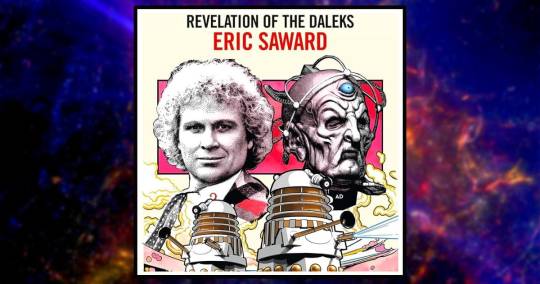
View On WordPress
0 notes